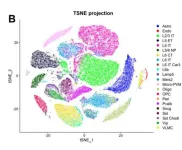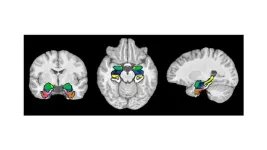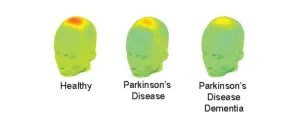(Press-News.org) LA JOLLA, CA—Alcohol use disorder (AUD) quickens the pace of Alzheimer’s disease progression when paired with genetic susceptibility. Scripps Research and University of Bologna scientists reported in the journal eNeuro on June 12, 2023, that repeated alcohol intoxication is associated with changes to gene expression indicative of disease progression in the brains of mice that are genetically predisposed to Alzheimer’s. When repeatedly exposed to intoxicating amounts of alcohol, these mice showed signs of cognitive decline approximately two months sooner than they usually would.
“Adding ethanol to an Alzheimer’s genetic background pushes Alzheimer’s forward by a few months or a few years,” says co-lead author Federico Manuel Giorgi, PhD, a professor of Computational Genomics at the University of Bologna.
Though few studies have explored the potential for alcohol to exacerbate Alzheimer’s disease, epidemiological studies have hinted that AUD could lead to a higher risk of developing dementia in general.
To explore the potential for alcohol to affect Alzheimer’s disease, the researchers exposed mice to alcohol repeatedly over the course of several months in a model that mimics levels of alcohol exposure for people with AUD. They compared control mice to mice that carry three genes that make them susceptible to Alzheimer’s.
The team found that, compared to control mice, alcohol-exposed mice became progressively worse at learning and remembering spatial patterns, and they showed these signs of cognitive decline at an earlier age than usual.
“We started seeing cognitive impairments in the alcohol-treated mice approximately two months before they would normally develop these impairments,” says co-lead author Pietro Paolo Sanna, MD, a professor of Immunology and Microbiology at Scripps Research.
The researchers characterized and compared the gene expression of more than 100,000 individual cells from the brains of alcohol-exposed and unexposed mice to pinpoint exactly what was happening in these cells during AUD.
They found that alcohol exposure was associated with widespread changes in gene expression in the prefrontal cortex. Specifically, alcohol-exposed mice had higher expression of genes associated with neuronal excitability, neurodegeneration, and inflammation. These changes occurred not only in neurons, but also in supporting cells such as astrocytes, microglia, and endothelial cells.
"This is interesting because it used to be thought that neurons were the ones carrying out all the responses associated with Alzheimer’s disease, and only recently have these cell types been recognized as having a role in Alzheimer’s pathogenesis," says Giorgi.
When the researchers compared the gene transcription profiles of the alcohol-exposed mice to unexposed mice of different ages and stages of Alzheimer’s with the same genetic background, they found that the gene transcription profiles of the alcohol-exposed mice more closely resembled those of older mice with more severe cognitive decline than mice their own age.
“When we compared the alcohol-exposed mice to the same type of mice with early or late progression of the disease—so mice that are not yet impaired in any way and mice that are really compromised—we found that the effect of alcohol is to move gene expression towards the advanced disease,” says Sanna.
Understanding how gene expression changes in different populations of cells during Alzheimer’s is an important step toward understanding the molecular mechanisms behind memory loss and developing therapies. The researchers speculate that the gene transcription pathways involved in Alzheimer’s progression with AUD may also help explain disease progression in the absence of alcohol consumption.
“The mechanisms of progression that this dataset will uncover may apply to Alzheimer’s in general, even without alcohol,” says Sanna. “Ultimately, this gene expression analysis will identify key regulatory genes that drive Alzheimer’s progression.”
Though this study focused on familial Alzheimer’s, in future the team plans to explore whether alcohol consumption also impacts the onset and progression of sporadic Alzheimer’s in people who are not genetically predisposed to the disease.
In addition to Sanna and Giorgi, authors of the study, “A history of repeated alcohol intoxication promotes cognitive impairment and gene expression signatures of disease progression in the 3xTg mouse model of Alzheimer’s disease,” include Amanda Roberts, Tomoya Kawamura, and Vez Repunte-Canonigo of Scripps Research; Chiara Cabrelle, Daniele Mercatelli of University of Bologna; and Nathan O'Connor of MBF Bioscience.
This work was supported by funding from the National Institutes of Health (AA021667, AA028982, AA006420, DA046170, and DA046204), the Italian Ministry of University and Research, the PNRR program, the HPC, and the Big Data and Quantum Computing project.
About Scripps Research
Scripps Research is an independent, nonprofit biomedical institute ranked one of the most influential in the world for its impact on innovation by Nature Index. We are advancing human health through profound discoveries that address pressing medical concerns around the globe. Our drug discovery and development division, Calibr, works hand-in-hand with scientists across disciplines to bring new medicines to patients as quickly and efficiently as possible, while teams at Scripps Research Translational Institute harness genomics, digital medicine and cutting-edge informatics to understand individual health and render more effective healthcare. Scripps Research also trains the next generation of leading scientists at our Skaggs Graduate School, consistently named among the top 10 US programs for chemistry and biological sciences. Learn more at www.scripps.edu.
END
Excessive alcohol consumption may accelerate Alzheimer’s disease progression
Scripps Research and University of Bologna scientists showed how excessive alcohol consumption in animals can hasten cognitive decline in those genetically predisposed to Alzheimer’s disease
2023-06-12
ELSE PRESS RELEASES FROM THIS DATE:
A step toward safe and reliable autopilots for flying
2023-06-12
In the film “Top Gun: Maverick,” Maverick, played by Tom Cruise, is charged with training young pilots to complete a seemingly impossible mission — to fly their jets deep into a rocky canyon, staying so low to the ground they cannot be detected by radar, then rapidly climb out of the canyon at an extreme angle, avoiding the rock walls. Spoiler alert: With Maverick’s help, these human pilots accomplish their mission.
A machine, on the other hand, would struggle to complete the same pulse-pounding task. To an autonomous aircraft, for instance, the most straightforward path toward the target is in conflict with what the machine needs ...
Mass General Hospital researchers uncover why light-to-moderate drinking is tied to better heart health
2023-06-12
BOSTON – A new study led by investigators from Massachusetts General Hospital, a founding member of the Mass General Brigham healthcare system, offers an explanation for why light-to-moderate alcohol consumption may be associated with lower risk of heart disease. For the first time, researchers found that alcohol, in light to moderate quantities, was associated with long-term reductions in stress signaling in the brain. This impact on the brain’s stress systems appeared to significantly account for the reductions in cardiovascular events seen in light to moderate drinkers participating in the ...
NIH grant backs study focused on Alzheimer’s in women
2023-06-12
HOUSTON – (June 12, 2023) – Two-thirds of the people suffering from Alzheimer’s disease are women, yet most research has ignored differences between the sexes.
To help fill this gap, Rice University postdoctoral fellow Hannah Ballard will look at how Alzheimer’s risk, estrogen levels and menopausal status interact with memory-related brain function and behavioral outcomes in women age 35-80.
Supported by a three-year grant from the National Institutes of Health (NIH), Ballard’s research could help identify the physiological factors ...
Self-esteem of kids with short stature tied to social supports, not height
2023-06-12
Philadelphia, June 12, 2023—Challenging the assumption that short stature negatively impacts children and adolescents’ self-esteem, a new study by researchers at Children’s Hospital of Philadelphia (CHOP) has found that in otherwise healthy short youth, quality of life and self-esteem are associated with coping skills and how supported they feel and not the degree of their short stature. The findings were published in The Journal of Pediatrics.
“There is a notion among some parents and caregivers that short stature will negatively impact their children in terms of self-esteem and social adjustment, so they seek out growth hormone ...
Brain waves may predict cognitive impairment in Parkinson's disease
2023-06-12
A few minutes of data recorded from a single electrode placed on top of the head may be sufficient to predict thinking problems, including dementia, in patients with Parkinson’s disease (PD). The finding from a new University of Iowa study might help improve diagnosis of cognitive disability in PD and develop new biomarkers and targeted therapies for cognitive symptoms of the disease.
“Cognitive decline, including dementia, is a significant and underappreciated symptom of Parkinson’s disease. ...
The Face Game: A citizen science project to learn how Artificial Intelligence will choose to appear to humans
2023-06-12
Online, profile pictures of human faces are everywhere, and they play a crucial role in shaping the first impression we make on others. Right now, AI gives people the digital tools to transform their online appearance in any way they desire, often making themselves look younger or more attractive. But this is just the beginning: AI is not only helping us play this face game amongst ourselves, but it is also learning the game from us and quietly deciding which face it will showcase as itself when interacting with us.
To better understand these mechanisms, researchers from the Max Planck ...
Ethics & Human Research, May-June 2023
2023-06-12
Making an Advance Research Directive: An Interview Study with Adults Aged 55 and Older with Interests in Dementia Research
Nola M. Ries, Briony Johnston
Many people with dementia are interested in taking part in research, including when they no longer have capacity to provide informed consent. Advance research directives (ARD) enable people to document their wishes about research participation prior to becoming decisionally incapacitated. However, there are few available ARD resources. This Australian interview study elicited the views of people aged 55 years and older about the content of an ...
Visionary report unveils ambitious roadmap to harness the power of AI in scientific discovery
2023-06-12
Innovations in artificial intelligence (AI) are rapidly shaping our world, from virtual assistants and chatbots to self-driving cars and automated manufacturing. Seizing on the potential of AI to transform science, the nation’s leading experts in science and technology have released a blueprint for the United States to accelerate progress by expanding its capabilities in AI and big data analysis.
“AI for Science, Energy, and Security” lays out a comprehensive vision ...
Masai giraffes more endangered than previously thought
2023-06-12
UNIVERSITY PARK, Pa. — Giraffes in eastern Africa may be even more endangered than previously thought. A new study led by researchers at Penn State reveals that populations of Masai giraffes separated geographically by the Great Rift Valley have not interbred — or exchanged genetic material — in more than a thousand years, and in some cases hundreds of thousands of years. The researchers recommend that the two populations be considered separately for conservation purposes, with separate but coordinated conservation efforts to manage each population.
Populations of giraffes have declined rapidly in the last thirty years, with ...
WVU research shows how much pharmaceutical companies are capitalizing on rare drug incentives
2023-06-12
Drugs used to treat rare conditions are earning pharmaceutical companies almost as much as those marketed to the general public, according to a researcher at West Virginia University. Sean Tu, a College of Law professor found lucrative so-called “orphan” drugs earn manufacturing tax credits, have longer patent exclusivities and face easier Food and Drug Administration review.
Orphan drugs treat diseases that affect fewer than 200,000 Americans. In addition to tax credits, Congress has incentivized the pharmaceutical companies that manufacture orphan drugs with a waiver of ...
LAST 30 PRESS RELEASES:
GLP-1 drugs associated with reduced need for emergency care for migraine
New knowledge on heritability paves the way for better treatment of people with chronic inflammatory bowel disease
Under the Lens: Microbiologists Nicola Holden and Gil Domingue weigh in on the raw milk debate
Science reveals why you can’t resist a snack – even when you’re full
Kidney cancer study finds belzutifan plus pembrolizumab post-surgery helps patients at high risk for relapse stay cancer-free longer
Alkali cation effects in electrochemical carbon dioxide reduction
Test platforms for charging wireless cars now fit on a bench
$3 million NIH grant funds national study of Medicare Advantage’s benefit expansion into social supports
Amplified Sciences achieves CAP accreditation for cutting-edge diagnostic lab
Fred Hutch announces 12 recipients of the annual Harold M. Weintraub Graduate Student Award
Native forest litter helps rebuild soil life in post-mining landscapes
Mountain soils in arid regions may emit more greenhouse gas as climate shifts, new study finds
Pairing biochar with other soil amendments could unlock stronger gains in soil health
Why do we get a skip in our step when we’re happy? Thank dopamine
UC Irvine scientists uncover cellular mechanism behind muscle repair
Platform to map living brain noninvasively takes next big step
Stress-testing the Cascadia Subduction Zone reveals variability that could impact how earthquakes spread
We may be underestimating the true carbon cost of northern wildfires
Blood test predicts which bladder cancer patients may safely skip surgery
Kennesaw State's Vijay Anand honored as National Academy of Inventors Senior Member
Recovery from whaling reveals the role of age in Humpback reproduction
Can the canny tick help prevent disease like MS and cancer?
Newcomer children show lower rates of emergency department use for non‑urgent conditions, study finds
Cognitive and neuropsychiatric function in former American football players
From trash to climate tech: rubber gloves find new life as carbon capturers materials
A step towards needed treatments for hantaviruses in new molecular map
Boys are more motivated, while girls are more compassionate?
Study identifies opposing roles for IL6 and IL6R in long-term mortality
AI accurately spots medical disorder from privacy-conscious hand images
Transient Pauli blocking for broadband ultrafast optical switching
[Press-News.org] Excessive alcohol consumption may accelerate Alzheimer’s disease progressionScripps Research and University of Bologna scientists showed how excessive alcohol consumption in animals can hasten cognitive decline in those genetically predisposed to Alzheimer’s disease






